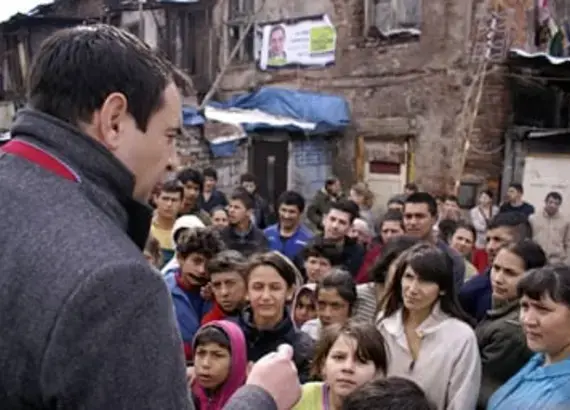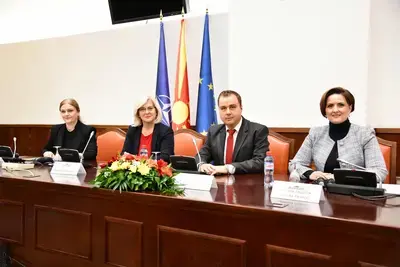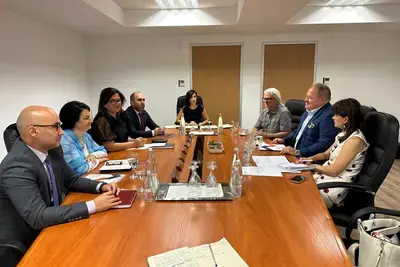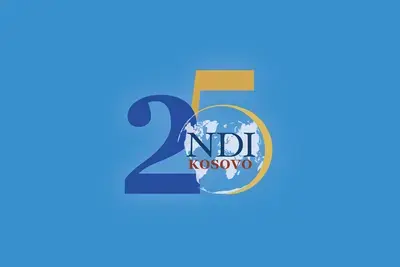
Success Story
Slovakia Elects First Roma Representative to Parliament
Slovakia made history in April when Peter Pollak took his seat in parliament as the country’s first Roma citizen elected to nationwide office. His victory in March’s parliamentary elections is the culmination of a decade-long journey of grassroots organizing, coalition building and setbacks at the ballot box that ultimately, through perseverance and support, paved the way to his breakthrough this year.
In a region where Roma are treated as second-class citizens, with few opportunities to escape poverty and reverse centuries of discrimination and isolation, Pollak’s victory is a testament to his resilience. In Slovakia, Roma, who have been largely excluded from the political arena, make up an estimated 8 to 10 percent of the country’s 5.4 million citizens.
His first campaign attempt was in 2005 regional elections, but his path to politics began several years earlier. In 2001, he participated in NDI’s youth leadership academies, designed to promote political participation by young people, and he became actively involved with the Institute after the launch of its regional Roma political participation program in 2004. Engagement in NDI’s activities equipped Pollak with the knowledge and skills to take the next steps in his political career. Moreover, he was able to connect with like-minded activists in Slovakia and around the region.
During the 2005 campaign he conducted the first ever door-to-door campaign in segregated Roma settlements with a team of more than 70 volunteers.
In 2009, Pollak ran again, unsuccessfully, for the regional government. But his campaign efforts increased his visibility among both Roma and non-Roma communities – an important step in his political future.
His last unsuccessful bid for elective office came in 2010 parliamentary elections, when he was a candidate on the list of a mainstream political party, Most/Hid, which ran on the platform of inclusion and support for minorities.
When the government collapsed last fall, new elections were scheduled for March, and Pollak had another chance. This time, he joined a new political movement – Ordinary People, Independent Personalities (OLaNO) – to take a top-10 spot on its party list. When OLaNO won 16 seats on March 10, Pollack was among them.
After the election, NDI sat down with him to discuss his journey to parliament.
You grew up in a segregated Roma settlement in Levoca (north central Slovakia). Living in this environment, there is little opportunity for education and advancement and limited access to resources. How were you able to overcome these constraints to complete your secondary education and university degree?
My parents, although living in a poor and not very inspiring environment, always led me to value education and hard work. I was lucky to attend elementary school in my town and most of my classmates were non-Roma kids. After finishing high school, I had to work hard manual labor to make a living and support my family – as did many of my peers. But, with the support of my family and education, I was able to overcome limits and attain a university degree.
What was the motivation for your civic and political activism?
Like many other young Roma, I realized that I have limited opportunities because of the fact that I am a Roma. I always wanted to change that. I refused the fate and life path that a racist society would draw for me. I tried various ways to change the situation until I realized that the best means of positive change dwells in political participation and Roma must reach elected offices.
"I tried various ways to change the situation until I realized that the best means of positive change dwells in political participation and Roma must reach elected office."
On March 10, you were elected to the National Council of the Slovak Republic, becoming the first Roma member of parliament in Slovak history. However, this was not your first campaign. You ran for regional office in Kosice in 2005 and 2009, and for national parliament in 2010. What changed in this election campaign that enabled you to win?
This campaign was different because for the first time we had a full-time campaign manager. For the first time, because of our fundraising, we were able to pay this person so he could dedicate all of his time to our campaign. We also improved at identifying our potential voters, which enabled us to target our messages more effectively. This time we mostly focused on the Roma middle class, with the exception of a few settlements where I have a good reputation and solid support, in contrast to our previous campaigns when we targeted Roma from segregated settlements. The main reason for this decision was that the middle-class Roma are not easily manipulated during the elections. They are not targets of vote-buying, thus are more reliable as voters.
We used every opportunity to talk to middle-class Roma. For example, we attended Roma dance balls – February is a popular month for balls. During these events we had a chance to communicate with many Roma who were leaders of their communities, successful entrepreneurs and authorities. In these balls we altered our door-to-door campaign to be a table-to-table campaign and it worked very well.
We also designed campaign strategies to target non-Roma.
"My previous campaigns gave me a strong and supportive team of volunteers who knew what to do and how to do it."
One of the key factors of our success was the support from the Ordinary People, Independent Personalities (OLaNO) party. The president of the party expressed his public support to me and this gesture created strong interest from national and regional media, which gave me a chance to present my messages. This also helped us fundraise more efficiently. For example, we advertised for free in regional advertising magazines that reach 1.5 million households in Slovakia, and enjoyed interviews and free advertising on the radio.
However, without my previous three campaigns I would not have been elected. My previous campaigns gave me a strong and supportive team of volunteers who knew what to do and how to do it. I systematically worked with my team over seven years and built support among my voters.
In this campaign, you ran on the list of a mainstream political party and you received many non-Roma votes. How do you see cooperation of Roma politicians and activists with non-Roma parties and mainstream politics on the local, regional and national level?
Roma are a heterogeneous group with many differences and therefore it is very difficult for a Roma ethnic political party to be successful. A Roma political party can succeed only if it is able to get non-Roma votes. More and more Roma try to find their place in mainstream political parties, but in the past they were not very successful. One of the reasons I was elected to the parliament is the fact that a strong mainstream party – though new and not very traditional – put me in a high position on the electoral list and supported me as a Roma candidate publically.
NDI’s regional Roma political participation program in Central and Eastern Europe is funded by the National Endowment for Democracy. The initiative seeks to increase Roma political participation by equipping Roma civic and political activists with the skills to advocate for policies to improve the lives of marginalized groups, effectively represent their communities, run well-organized campaigns and share their expertise with emerging activists in their country and neighboring states.
Read more:
Published April 23, 2012



